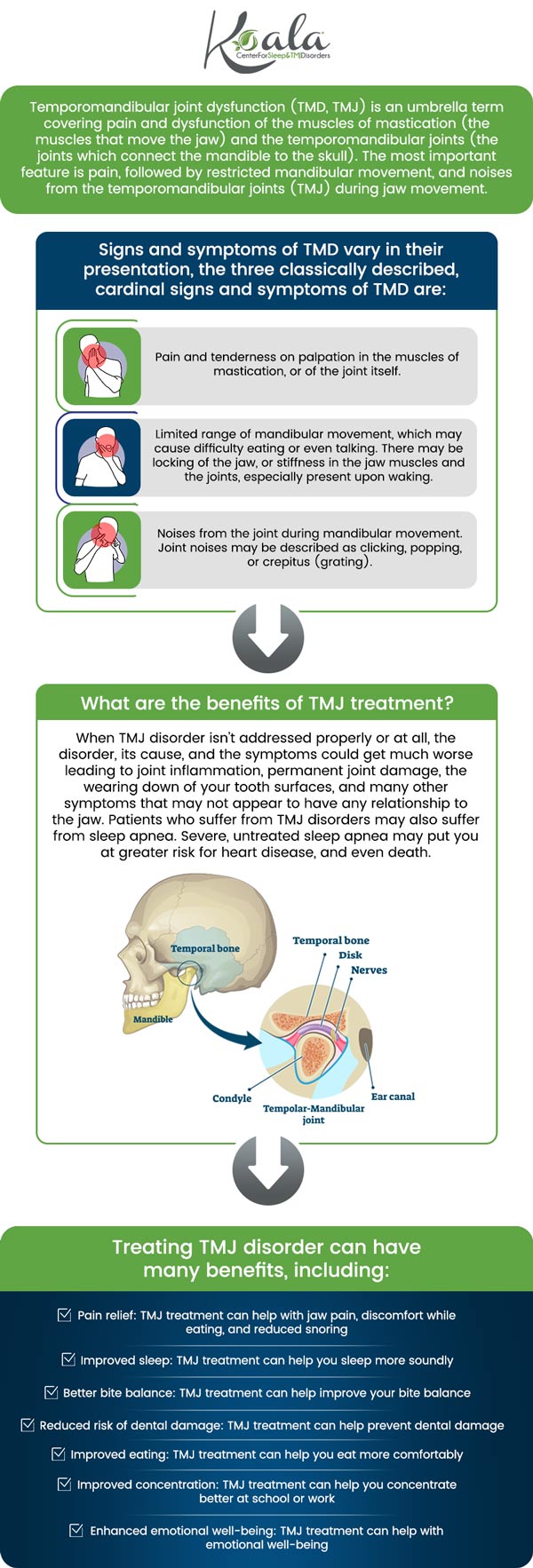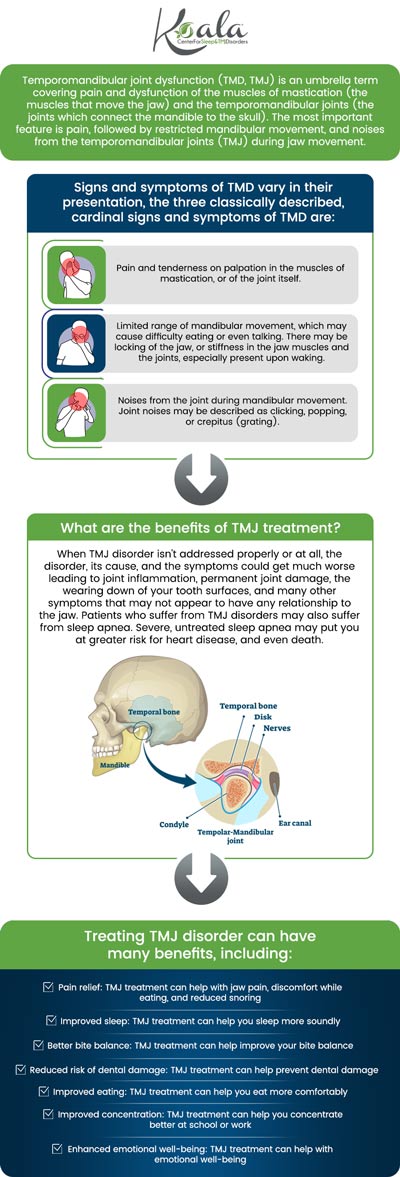TMJ Facial Pain Experts in Peoria, IL
At Koala Center For Sleep & TMJ Disorders, we believe that maintaining proper dental alignment is essential for optimal jaw function and overall facial comfort. If you suspect that your dental alignment may be contributing to your TMJ pain, we highly recommend you seek a professional evaluation at any of our centers. For more information, contact us or book an appointment online. We serve patients from Peoria/Dunlap IL, and surrounding areas.




Table of Contents:
Is TMJ-related facial pain common?
Can TMJ disorders cause pain in other areas of the face?
Can poor dental alignment contribute to TMJ-related facial pain?
What treatments are available for TMJ-related facial pain?
TMJ disorders, which affect the hinge that connects your jaw to your skull, are a common cause of facial pain. In fact, it’s estimated that approximately 10-15% of individuals experience symptoms that meet the diagnostic criteria for TMJ disorders.
TMJ-related facial pain can manifest in various forms and severities, ranging from mild discomfort to debilitating pain. It can be sharp and searing, occurring in or around the ear, or it may be dull and constant, felt along the jawline, neck, or cheeks. It may occur only when the jaw is in use, or it can be persistent throughout the day.
We are committed to helping our patients find relief from TMJ disorders. Our team is skilled in diagnosing and treating TMJ-related facial pain. If you’re experiencing persistent facial pain, we encourage you to see one of our healthcare providers for an evaluation. The pain could be a symptom of TMD or another condition, such as neuralgia, sinusitis, or dental problems.
At Koala Center For Sleep & TMJ Disorders, we understand that TMJ disorders are more than just jaw pain. The complex network of nerves and muscles around the TMJ can transmit pain signals to various parts of the face, neck, and even shoulders. We recognize that TMD can cause pain in your temples and, cheekbones and even lead to ear pain due to the joint’s proximity to the ears.
Moreover, we are aware that some people might experience pain in and around the ear, in the cheeks, forehead, neck, and shoulders. These areas are closely connected to the TMJ and upper body, meaning that a disorder in the joint can further cause pain in these areas.
In addition to pain, we understand that TMD can also cause difficulty or discomfort while chewing, a clicking or grating sound in the jaw when you open your mouth or chew, and even locking of the joint, making it difficult to open or close your mouth. Some people also experience headaches, dizziness, hearing problems, or ringing in the ears (tinnitus).
We strongly believe that treating your TMJ disorder will not only alleviate your pain but also improve your quality of sleep. If you’re experiencing persistent pain in your face, jaw, or neck, we encourage you to seek medical advice from our team of professionals. We can help determine whether a TMJ disorder is the cause of your symptoms and recommend appropriate treatment options. Our goal is to help you achieve a pain-free and restful night’s sleep.
Our dental professionals understand the intricate biomechanical system formed by our oral and facial structures, and how malocclusion can place undue stress on the temporomandibular joint, a complex structure connecting the jawbone to the skull. This joint, responsible for movements like chewing, speaking, and yawning, can become inflamed, leading to a variety of painful symptoms when the teeth are not properly aligned.
Symptoms of TMD can significantly affect a person’s quality of life. These symptoms may include facial pain, especially around the jaw joint, headaches, earaches, difficulty opening and closing the mouth, and a clicking or popping sound when moving the jaw.
Our experienced professionals are equipped to diagnose and treat cases where malocclusion is the underlying cause of TMJ disorders. Orthodontic treatment can often offer relief by correcting the alignment of the teeth. This treatment helps to redistribute the forces on the jaw, relieving strain on the temporomandibular joint and reducing TMD symptoms.
While poor dental alignment can contribute to TMJ-related facial pain, we also understand that other factors such as arthritis, facial injuries, bruxism (teeth grinding), and stress and anxiety can play a role. Therefore, our comprehensive approach includes a thorough examination, diagnosis, and recommendation of appropriate treatment options, which may involve orthodontic interventions, medications, or physical therapy.
We offer comprehensive treatment options for TMJ-related facial pain, which can cause distress by impacting the jaw, head, and neck and interfere with daily activities. Our expertise in this field enables us to effectively manage this discomfort through various treatment options, including conservative measures, procedural interventions, and alternative therapies.
Conservative Measures: Medications form the initial line of defense to alleviate TMJ-related facial pain. Over-the-counter pain relievers and non-steroidal anti-inflammatory drugs (NSAIDs), including ibuprofen, to manage pain and inflammation may be suggested. For more severe cases, stronger pain relievers may be prescribed, and muscle relaxants may be utilized to ease jaw muscle tension.
Our dental treatments also play a role in managing TMJ disorders. Custom-made oral appliances or mouth guards offered at Koala® Center For Sleep & TMj Disorders can help reduce teeth grinding or clenching, a common cause of TMJ-related facial pain. Dental work to correct bite issues or misaligned teeth can also reduce stress on the jaw and alleviate pain. Additionally, we may recommend heat or cold therapy to soothe discomfort and reduce pain.
Procedural Interventions: If necessary, minimally invasive treatments such as arthrocentesis, Botox injections into the jaw muscles, transcutaneous electrical nerve stimulation (TENS), and ultrasound therapy may be suggested. For severe cases that don’t respond to other treatments, more invasive surgical procedures may be considered to correct jaw misalignment or remove damaged joint tissue.
Alternative Therapies: Physical therapy exercises to strengthen jaw muscles, improve flexibility, and promote healing may also aid in providing relief from TMD symptoms. Techniques like acupuncture or massage may be utilized to release muscle tension and improve circulation. Dietary modifications, stress management techniques, and cognitive behavioral therapy (CBT) can also be part of a comprehensive treatment plan.
We believe that the best treatment approach for TMJ-related facial pain varies greatly depending upon the individual’s specific symptoms, severity, and underlying causes. That’s why our healthcare professionals at Koala® Center For Sleep & TMJ Disorders provide a thorough evaluation to develop a tailored treatment plan for each patient.

Additional Services You May Need
▸ KoalaKIDZzz®
▸ Sleep Apnea
▸ Snoring
▸ TMJ Disorder
▸ Fatigue
▸ Sleep Disorders
▸ Weight Loss
▸ CPAP Alternative
▸ Oral Appliances




